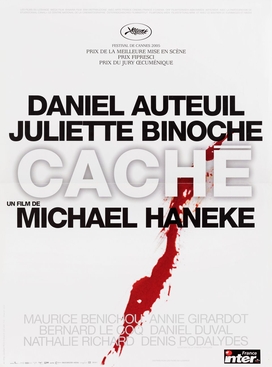Who Sent the Video Tapes?
As generally happens with mystery movies which are also "art movies" this question never gets answered in Cache, the latest film by the Austrian film director Michael Haneke. As viewers of his previous films know, there is hardly any other filmmaker currently working in world cinema who is more audience unfriendly. None of these facts will stop me in proclaiming that Cache is a masterpiece and perhaps the best film of the last year (I have still not seen many films of the last year, so this might be subject to revision).
The story is about an upper class intellectual couple living in Paris. Georges played by Daniel Auteiul is a host of some highbrow literary chat show on television (they discuss such esoteric literary subjects as the latest biography of Rimbaud's sister) and Anne, his wife, played by Juliette Binoche, works as an editor in a publishing firm. (Their apartment is full of books although it looks like that books are meant more for interior decoration than for reading.) They live a quiet, easygoing life until one day when they receive an anonymous video tape showing that they are under some kind of surveillance. More tapes follow, accompanied by childish drawings of faces squirting blood. Soon things start getting strange and difficult for the couple. They start bickering because Georges obviously is hiding something from his wife and is troubled and angry. A minor incident on street brings out the violent side of the supposedly civilised couple and finally, who is that boy with his face smeared in blood, whose image is flashed on the screen on more than one occasion? Is it Georges's dream?
Georges's investigation into the tapes leads him to his own past and to a rundown apartment which is now inhabited by an Algerian named Majid who is of the same age as Georges but looks so sad and heartbroken that the question of 'did he shoot the tapes?' doesn't arise at all. Not so for Georges who convinces himself that it is indeed Majid who is terrorizing his family and then goes on to threaten him. Majid, as it turns out, was betrayed by Georges in their childhood and this was when Majid's parents were killed in a protest by the French police (an actual historical event that happened). A couple of startlingly violent scenes follow which are sure the jolt anyone out of their seats and then the film ends with an extremely puzzling scene which made me dive right into the internet message boards as soon as I came out of the theatre.
I was initially suspecting a Lost Highway kind of resolution, thinking that it was indeed his own guilty conscience that was making Georges invent those tapes. In Lost Highway the guilty conscience gets personified into the spooky "mystery man" but Haneke, unlike David Lynch, leaves no room for metaphors or symbols to hide behind. It is all as naturalistic as it can be done. Shot on digital video, without camera movement and in long takes, the video or indeed the whole film, appears so detached, clinical and objective that it could only be the God's eye that is watching all of them. Okay, there goes my theory and I haven't stolen it from anywhere :)
Whoever sent the video tapes, the film remains a feast for the intellect, something that will challenge and provoke even the most laid back viewers to think about things that they wouldn't otherwise bother to think about. Haneke's two earlier films, The Piano Teacher and The Time of the Wolf, while undeniably brilliant, were very abstracted and almost theoretical works. Cache isn't like that. It is great psychology and great politics mixed with a genuine concern for the real world. A must, must see!
P.S. Don't leave the theatres before the end credits and don't forget to check out what is happening on the left bottom corner of the screen. This is if you are interested in contributing to the discussion on the message boards!
2 comments:
I am very much looking forward to the UK release of this.
It's worth waiting for!
Post a Comment